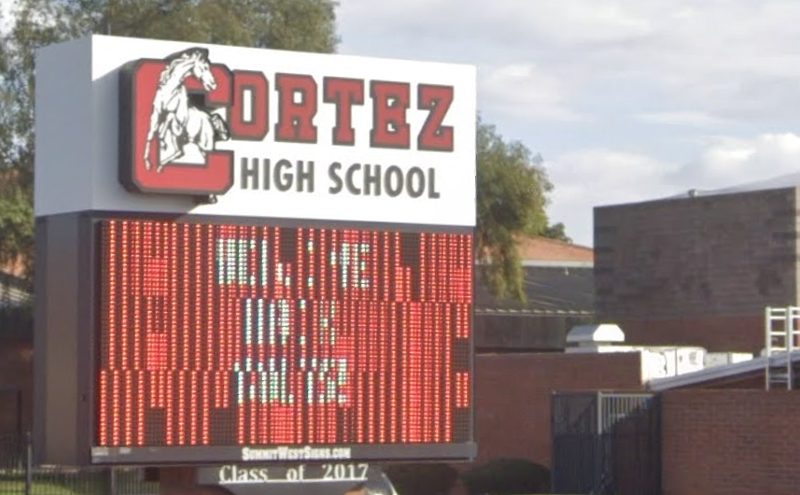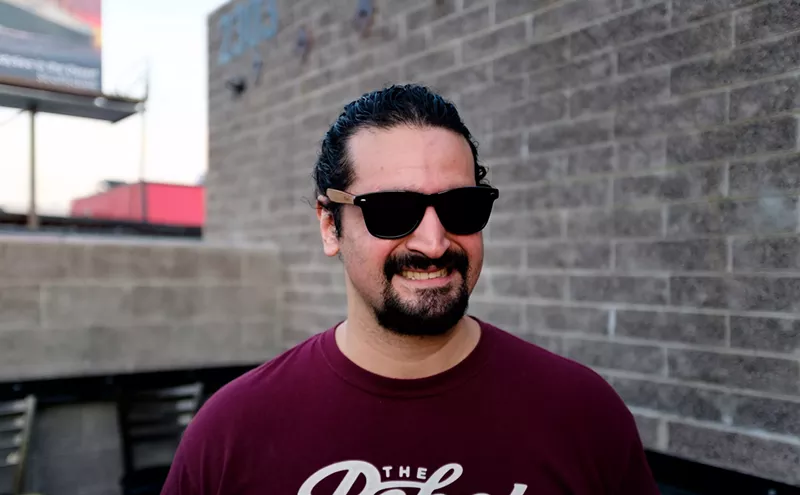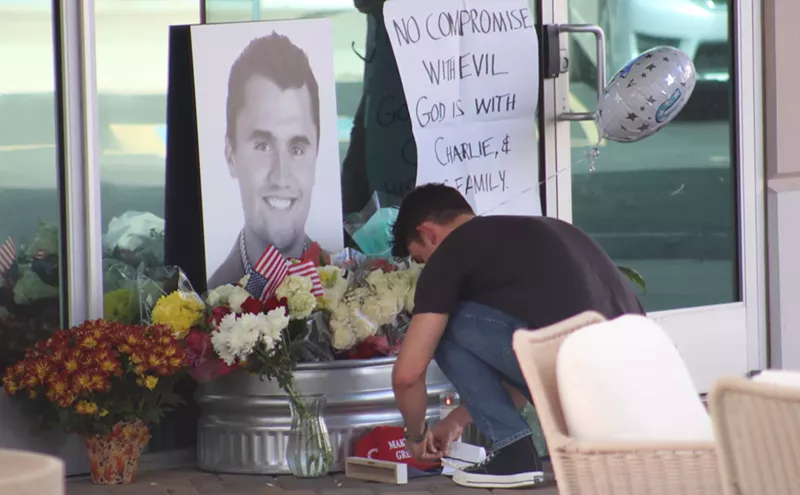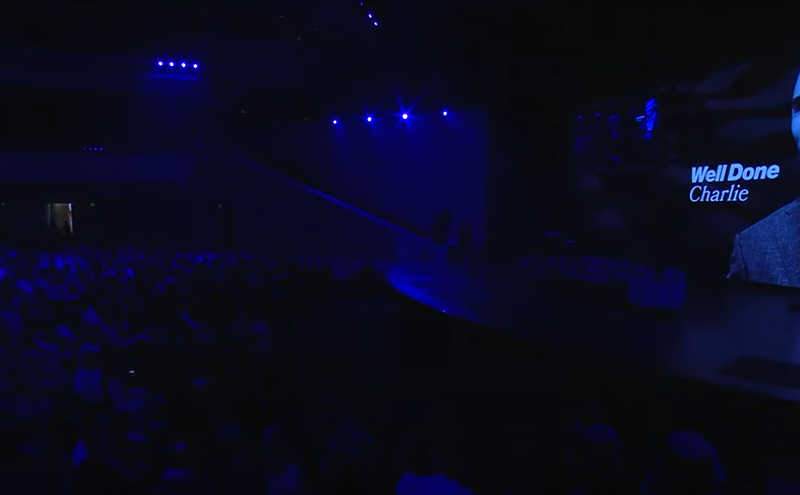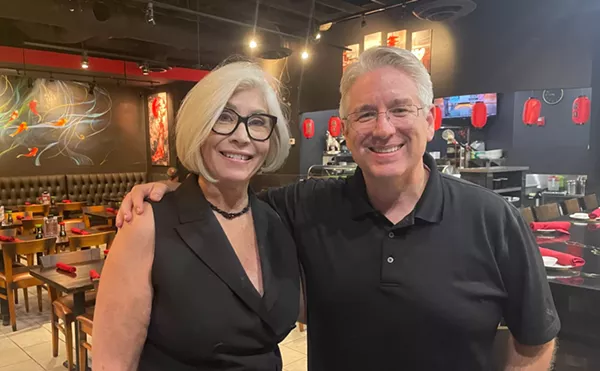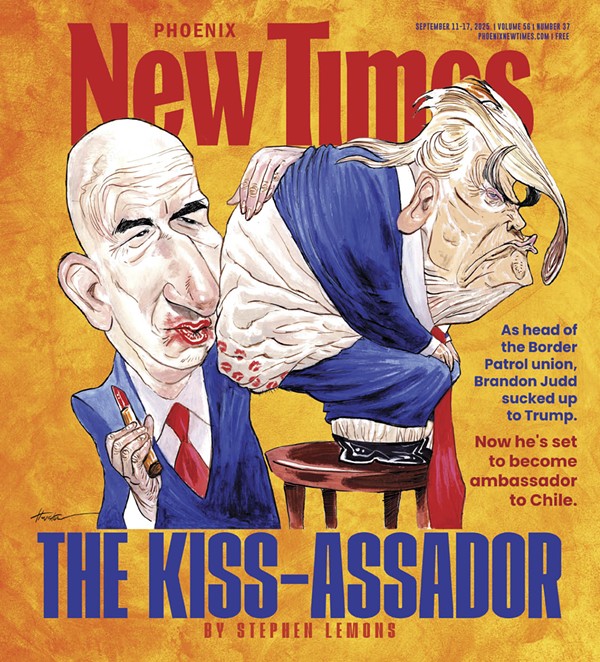A woman wrapping egg rolls on a table near the kitchen tells the man to sit where he wants. She and everyone else in the tiny joint perk up when he responds in perfect Vietnamese.
His name is Dung Van Chau, and he's the 32-year-old son of a Viet mother and African-American father, the latter whom he never knew. He's here to tell his mostly cheerless life saga, which began in Vietnam during the last years of the U.S. war effort there.
"I want to tell you some things," he says softly in English, amid the din of dishes and chatter.
Though his accent is thick, Dung Chau (pronounced yoong chow) has a more-than-passable command of his second language.
Just then, a couple walks into the restaurant and catches Chau's eye. The man is another black Amerasian, Jerome Pham. The pair hasn't seen each other in years. They hug, laughing.
Pham is a few years younger than Chau, and he recalls how Chau used to protect him when they ran the streets of Phoenix in their teens.
"He was a real good guy then," says Pham, a friendly, dapper fellow who also never has met his U.S. serviceman father. "He looked out for me, watched my back."
Pham says proudly that he became an American citizen in 2000, and still recalls the names of many U.S. presidents. He's doing well, Pham tells his old friend, with a good job and a house in Mesa.
Someone asks Pham if he thinks of himself as a Viet or an American. "American, of course," he says quickly, as if the question was inane. "Vietnam is my past. America is my present, my future."
Dung Chau's present and future, however, seem just as bleak as his past.
For starters, the U.S. government wants to deport him to Vietnam because he's been convicted of two felonies since he turned 18. Freed from custody last May after nearly five consecutive years of incarceration -- first in state prison, then in an immigration detention center -- Chau is just scraping by, trying to stay out of trouble, working here and there.
He came to this country as a 13-year-old in 1984 with his mother and half-brother, part of an immigration program that specifically was designed for Amerasians. Technically, he's living here as a "permanent resident alien."
In Vietnam, Chau was a pariah, a walking reminder of the American enemy that had retreated in 1975. There, he was one of thousands of children known as bui doi -- the "dust of life" -- who were treated as second-class citizens or worse.
In the States, Chau instantly became a triple minority -- black, Asian and an immigrant who didn't know English.
Add to that his lack of any formal education in Vietnam -- Amerasians weren't allowed to attend schools -- and a troubled, complex relationship with his mother. It doesn't surprise anyone who knows Chau's story that he's struggled mightily to find his niche in anything legal.
Chau quit school at 17 without learning how to read or write. He's dabbled in illicit drugs, ran with gangs, stolen cars and, in 1991, was convicted of stabbing someone. He spent about half of his 20s incarcerated.
Though Chau is pleasant and polite, and enjoys a good laugh, an undercurrent of depression colors his conversation. He says he thinks often about his two young children, a girl and a boy, who live in Philadelphia with their mother. But he's never even met his son, who is 4.
Chau says he taught himself how to read and write in prison, and that he's finally comfortable using English after almost two decades in the States.
He seems lost in himself as he considers the question about national self-identity that Jerome Pham just answered so easily.
"I was born in Vietnam," Chau says, "and now I live in the U.S., in Phoenix. I don't think I know the right answer."
Dung Chau is the definition of the old saw: a man without a country.
Because of his two criminal convictions, the U.S. wants to deport Chau -- but it can't. Currently, the U.S. has no agreement with Vietnam allowing deportation of native Vietnamese, and immigration officials suggest such an agreement may be years away.
So Chau is in the same boat as about 4,500 other aliens in the U.S. -- most prominently, natives of Cuba -- that the government wants to deport, but can't.
If Chau loses his court appeal of the government's standing deportation order, he faces the likelihood of being reincarcerated indefinitely at the sprawling Immigration and Naturalization Service (INS) detention center in Florence, where he spent the 15 months previous to last May.
The reason Chau isn't locked up there now is that his attorney convinced the government that he's not a flight risk. His case is before the federal Ninth Circuit Court of Appeals, one step below the U.S. Supreme Court.
In fact, Chau has nowhere to run. Literally the last place he wants to go is the Socialist Republic of Vietnam.
It's not that the U.S. government has targeted Dung Chau as a particularly bad actor: This nation simply has become much tougher on immigrants in recent years, immigrants who are here both legally and illegally.
The September 2001 terrorism at the World Trade Center fixed an unprecedented spotlight on America's immigration policies, and increased government vigilance over who's coming in and who's already here. But even before 9/11, a landmark 1996 law allowed INS to deport aliens for a broad range of criminal offenses, including petty theft and driving with a suspended license.
Chau got caught stealing a car in 1996. That was the year INS began deportation proceedings against him.
Earlier this year, a Ninth Circuit panel ordered U.S. District Judge Stephen McNamee in Phoenix to consider the key issues in Chau's protracted case, then report his findings to them.
For Chau to prevail, the judge will have to find that he "derived" American citizenship as the son of the unknown black U.S. serviceman. If so, Chau would be non-deportable to Vietnam, even if the two nations do sign a pact someday that would allow it.
Says Chau's attorney, Nancy-Jo Merritt, "Chau is ours, just like all the Amerasians are ours. We have no business sending him back to Vietnam. People here illegally and who commit crimes should be sent back, with the exception of political refugees. But he's not here illegally."
Dung Chau's immigration case can be boiled down to this: He entered the U.S. with his mother and half-brother under a 1982 law that offered speedy immigration to Amerasians born of American fathers and Asian mothers. (The law also allowed Chau's mother and half-brother to join him here. Neither has been in trouble with the law, but they aren't American citizens and it's uncertain what might happen to them if Dung eventually loses his case.)
Merritt claims Chau is non-deportable, because he came in under the 1982 law, not as a "refugee" or illegal alien. Government lawyers say it doesn't matter how Chau entered this country, because he didn't prove his "legitimacy" as a potential U.S. citizen by identifying his father before his 21st birthday.
If it sounds complicated, it is. But the best evidence that Dung Chau's father was an African-American serviceman is stunningly simple -- Chau himself. No one can reasonably deny that he looks more African-American than Vietnamese. And Chau's mother, Mai, has been saying for years that the boy's father was a black serviceman named Nick whom she met in early 1971 at a Danang bar that catered to U.S. military.
It's far-fetched to think that a black man in a GI bar during the Vietnam War wasn't in the U.S. military. But the government continues to insist that Chau needs more than supposition and a heart-rending story to prove he has legal claim to be an American citizen.
In early November 1971, President Richard Nixon announced that U.S. troops would be moving into a "defensive" posture in Vietnam. That month, 178 American soldiers would be killed in combat, the lowest number since the conflict escalated in earnest in January 1965.
Also that November, an illiterate 17-year-old girl named Mai Chau was about to give birth to her first child. Mai had discovered she was pregnant that spring, and she awaited the baby's birth in a two-story apartment teeming with her extended family in what then was Saigon (now Ho Chi Minh City).
Twenty-seven years later, at a deportation hearing for her son at the Arizona State Prison at Perryville in 1998, Mai Chau testified about the circumstances that led to that pregnancy. "I met Dung's father in a bar," she told a judge through an interpreter. "After one month, then I was pregnant, and I have never seen [him] after that. He was in the U.S. forces in Vietnam. And when he get a leave, he visited me at the bar and he was dressed in the uniform of paratroopers. His name was, I think it was Nick."
Mai Chau claimed she'd only met Nick once or twice, but that her oldest son resembled him: "He was tall, dark and he had the mark on the right cheek, a dimple, a small dimple, like a coin."
As the end of the war approached in early 1975, rumors flew around Vietnam that the Communists would drench the Amerasian children with gasoline and set them afire after the U.S. left. What actually did happen to kids such as Chau and tens of thousands of other Amerasian children was documented by Robert McKelvey in his book The Dust of Life: American Children Abandoned in Vietnam.
"To be a Vietnamese Amerasian in postwar Vietnam," McKelvey wrote, "was to be a child growing up in the hands of your father's enemies. The hatred that the enemy had felt, and continued to feel, for your father and his country was directed against you, even though you were innocent of any wrongdoing."
Alex Feminia, a veteran Phoenix police detective and an expert on Asian gangs, says he's spoken to many Amerasian kids about their lives here and in Vietnam. "Though this has been an unsaid thing in the Vietnamese community," he says, "there's always been a tendency to look down on these so-called half-breeds.' Talk about racism -- it's crazy."
After the U.S. left Vietnam, Amerasian children weren't allowed to attend school, and were subjected to frequent beatings by other kids. Even worse, their own mothers often shunned them in favor of their "full-blooded" siblings.
Dung Chau says he remembers walking the streets of Ho Chi Minh City as a youth, ever alert to the possibility that a gang of kids might jump him or throw rocks at him just because of the way he looked.
"Not fun," he says. "I didn't learn many things, but Chinese people let me clean fish for [pennies]. Grandma nice always. My aunt was nice, too. Mom nice sometimes. Not a lot of friends, 'cause no one look like me."
In July 1980, Mai Chau gave birth to a second son, named Thuan. (He's called Joe these days, and works for a Tempe computer company.) Immigration records indicate that Thuan's father was a Vietnamese man who later died.
By then, stories about the plight of Amerasian children living on the streets of Vietnam had disturbed many Americans. In 1982, two U.S. congressmen proposed a law they hoped would improve matters.
Congressman Stewart McKinney of Connecticut, one of the Amerasian Children Act's sponsors, said during hearings, "The effort will not be to identify the actual father. The effort will be to establish only that the young person is the offspring of a U.S. citizen."
Tellingly, the bill never did say an Amerasian child specifically had to name his or her father, an impossible task for most immigrants. For example, no one knew if Dung Chau's alleged father, "Nick," was still alive, or had been one of the 7,241 black Americans killed in action during the Vietnam War. And if he were alive, how could anyone find him?
In fact, according to an Ohio State University study published in 1999, of the 25,000 Vietnamese-Amerasian children who eventually entered the U.S. under immigration-incentive laws that ended in the early 1990s, only 3 percent succeeded in meeting their biological fathers. That contrasted with the 76 percent in the study who said they'd wanted to meet their dads.
The heal-the-wounds bill sailed through Congress in late 1982, and President Ronald Reagan signed it into law that October 22. Reagan said that day, "Americans have always opened their hearts to those coming from distant lands to make a new life here, to live in freedom, and to improve their lot. In this case I think we should go a step further. Instead of saying welcome to these children, we should say welcome home.
"This good and humane law -- and it is that -- recognizes the rightful claim of Amerasian children to American citizenship and permits their entry into our country after arrangements have been made for their care with the families or with private organizations."
In a way, it was the biggest paternity settlement in history. Specifically, it was designed to allow Amerasian children born between 1950 and 1982 (that covered both the Korean and Vietnam wars) to come to America as top-priority immigrants. Once they got here, the Amerasians and their immediate families were to be helped financially, socially and otherwise in integrating into their new lives.
John Richardson, a Vietnam veteran then working for the Joint Chiefs of Staff in Washington, D.C., personally carried the Amerasian Children Act to the government printing office. Years later, Richardson presided as the immigration judge at Dung Chau's deportation case in Phoenix, during which the interpretation of the 1982 act was a central topic.
In Vietnam, word quickly spread about the Americans' new law. The scorned Amerasians suddenly became the golden children, the means to a one-way ticket for thousands of mothers and siblings from unceasingly harsh lives into the supposed land of plenty.
In December 1983, shortly after Dung Chau's 12th birthday, his mother took him to an office for an interview with Vietnamese and American officials. Chau recalled at his 1998 deportation hearing that a black American soldier had questioned his mother through an interpreter.
"I thought it was my father," he testified, in the hearing's most poignant moment.
On Memorial Day 1984, Dung, Mai and Thuan Chau flew on a U.S. government plane to an orientation camp for Amerasians in Bangkok, Thailand. It was the first leg of their journey to the States. They took with them little more than a few personal mementos and a few suitcases.
The Chaus then spent months at a camp in the Philippines. Finally, in December 1984, they landed in Los Angeles. They were among the first of the Vietnamese Amerasian families -- about 77,000 people in all -- who immigrated here under the 1982 law and subsequent laws.
The Chau family's sponsor was the Tolstoy Foundation, a nonprofit agency based in New York City. The agency placed the trio in a comfortable apartment in Phoenix's Sunnyslope neighborhood, and provided immediate support by helping them secure the basics -- food, medical treatment, clothes, furniture and enough money to get by.
Caseworkers also introduced Mai Chau to other Viets, and she found work as a manicurist in the fast-growing Asian community in west Phoenix.
For 13-year-old Dung Chau, those first days in the States were overwhelming. "I remember it was cold, cold, cold, it was Christmastime," he says. "It was like being in a whole different world. I didn't know English but one word -- hi.' I said that word a lot."
On June 30, 1986, Catholic Social Services of Phoenix sought legal custody of Dung Chau at Maricopa County Superior Court.
Its petition said Mai Chau "is no longer willing or able to care for Dung Chau," and asked a judge to place him in foster care.
Just 18 months had passed since the Chaus had immigrated. A Catholic Social Services caseworker wrote at the time that it was "apparent . . . that Dung was being neglected, unsupervised and emotionally abused."
The caseworker alleged Mai Chau often made Dung stay home to watch his little brother instead of attending school. She also said the state's Child Protective Services agency had responded to the Chau residence several times after complaints of neglect.
Chau, the caseworker wrote, often referred to himself as too stupid to attend school.
"I was not too stupid," he says now, "but I couldn't learn at school, didn't want to. I was mad at stuff. I learned English words on cartoons, that's all, not school."
Catholic Social Services soon became Dung's temporary guardian, and the boy, not yet 15, moved in with a Latino family in Chandler. It was his first of five foster-care placements over the next four years.
During that time, the Catholic Social Services caseworker contacted Mesa resident Bill Laurie, a veteran of three tours of Vietnam (1973-75) and a man who long has studied both the language and culture of that country.
Says Laurie, "She told me that Dung wasn't going to school, his mom was never around, he needed direction, and she thought I could help."
Laurie found a warm and enduring spot for Chau, with whom he spent many hours over the next few years, fishing, having him over for dinner with his family, just talking.
"Dung was totally overwhelmed by chaos of the greater Phoenix metroplex," Laurie recalls. "It was as if they'd stuck him on a different planet. When I met him, he was just immature, and displayed the curiosity and awe of an 8-year-old. My own son thought he was the nicest guy. Had that kid had any sort of a stable upbringing with structure around him, I'm convinced he has the ability to function as a normal human being. He didn't have that opportunity."
In early 1989, Chau dropped out of school for the final time, shortly after educators promoted him -- somehow -- to a 10th-grade level. By this time, he practically was living on the streets of west Phoenix, where he was prime fodder for gangs and drugs.
"These Amerasian kids were the definition of at-risk children when they got here, and it stayed that way for many of them," says Alex Feminia, the Phoenix detective. "The federal government enacted a law that was a good idea -- getting these kids out of Vietnam -- but with little infrastructure behind it, and little clue what to do when reality struck. It came down to us having to immediately deal with a whole bunch of Dung Chaus."
Tempe police arrested Chau four days before his 19th birthday in November 1990, after a young Latino man was stabbed at a teen-only club. Though the circumstances of the assault remain cloudy, Chau told a probation officer that he'd carried a knife that night "because I'm small."
He pleaded no-contest to aggravated assault, and normally would have been sentenced to a prison term because the victim was injured.
Then, Bill Laurie, the Viet vet who had befriended Chau, asked Phoenix private investigator Mary Durand to prepare a report about the young man's life.
Durand spent weeks piecing together a layered analysis of Chau's unfortunate life, which the young man's defense attorney submitted to Judge Robert Hertzberg along with letters asking for leniency.
"He was cast adrift when he came over here," Bill Laurie wrote in his letter. "He had trouble in school because he did not speak English and the kids picked on him. He has been through hell because of the discrimination against Amerasians. He was born and raised in an environment where he is considered an outcast, where he is trash."
If sent to prison, Laurie said, Dung Chau would again learn "that he is an impotent societal reject, having no rights or any reason to expect any from an external hostile world, beyond that which it might toss to a beggar."
Judge Hertzberg responded by placing Chau on probation in February 1992. Chau had spent 117 days in jail until the case was resolved.
That year, Chau's first child, a daughter named Amber, was born to a native Vietnamese woman with whom he'd been involved. But fatherhood didn't settle him down.
The courts revoked Chau's probation in early 1993 after he tested positive for crack cocaine and marijuana.
He was sent to prison in May 1993, and served about 18 months before being granted parole. A car theft in 1996 led to another prison term (and the completion of the assault sentence for which he'd been granted parole).
But even the Arizona Department of Corrections seemed better than what the U.S. government had in mind for him.
Dung Chau's second felony conviction came at a particularly bad time for immigrants to the United States.
The government's once-benevolent attitude toward immigrating Amerasians had chilled by the early 1990s, as tales of fraud (getting here) and other criminal activity (once they got here) emerged.
During that stretch, Congress held hearings that focused on the failure of INS to cope with increasing rates of crime committed by aliens. In 1996, President Bill Clinton signed the get-tough-on-immigrants law that directly affected Dung Chau and thousands of others. Among the changes, that law empowered INS to seek deportations even for misdemeanor convictions.
Deportations increased exponentially within a few years. And aliens from nations lacking normal extradition agreements with the U.S. would be detained indefinitely in quasi-prisons such as the one in Florence. (There are now about 4,500 of those "non-returnables," as they became known, in INS facilities around the nation, according to a spokesperson for Amnesty International.)
In September 1996, the U.S. government informed Dung Chau that it planned to deport him for having been convicted of two crimes "of moral turpitude" -- the assault and the car theft, and of one "aggravated felony" (the same car theft). He got the news at the state prison in Perryville, where he'd been incarcerated for three months.
After several false starts, Chau's deportation hearing finally took place on March 3, 1998, in a little courtroom at the Perryville prison.
"Basically," Judge John Richardson told Chau, "the government has asked of me to order you deported from the United States. Understand that? Do you know what deportation is? Are you following me?"
"Yeah, sir," Chau replied. "I try."
His attorney, Nancy-Jo Merritt, was fortunate in having Richardson as a judge. Local immigration attorneys call him a thinking man's jurist, no small compliment in a job often mind-numbing in its repetition and bureaucratic overload.
Merritt, who specializes in immigration law, had gotten into the case at the urging of private investigator Durand -- who had stayed in close contact with Chau through the years.
Now a partner at the Phoenix law firm of Fennemore Craig, Merritt says she agreed to take on the case for free because she liked Chau, and believed she had a compelling legal argument to make for him.
Richardson heard testimony during the hearing from Durand, Mai Chau, and Dung Chau.
Like her son, Mai Chau remembered the black American who'd interviewed her in Ho Chi Minh City in 1983.
"He asked me about my life," she said through a translator, "and I told him that being the mother of an Amerasian, my life is very difficult in Vietnam."
Dung Chau told the judge that he'd been called nasty names in Vietnam for as long as he could remember, adding through an interpreter, "The black American could not attend school, he could not do anything."
"Did your mother ever talk about your father?" Merritt asked him.
"Yes," Chau answered. "She told me about him, but that was when I was too young, and then I do not recall."
INS attorney David Peters argued that Chau's admittedly tragic upbringing in Vietnam wasn't the issue at hand.
". . . There is no evidence that Congress intended to legitimate the children covered within the Amerasian Children Act, or any of the subsequent related acts," Peters said. "If they did, they wouldn't be coming to the U.S. as permanent residents, they would be coming to the U.S. as citizens . . ."
Responded Nancy-Jo Merritt, "The determination has been made that his father is a U.S. citizen. That's been made by the U.S. government. Otherwise, he wouldn't be out of Vietnam, he'd still be there. Second, the law of unintended consequences has brought us to where we are today. By saying that he's a child under the Amerasian Children Act, that makes him legitimated. I can't help it if Congress didn't notice that."
Richardson rendered his opinion at the end of the hearing: "The evidence is clear and irrefutable that [Chau], in fact, entered the U.S. as an Amerasian child. . . . There is no question as to his entry under the Amerasian Children Act as the son of a citizen of the U.S. -- a service member."
Dung Chau's stunning victory was short-lived. In March 1999, the INS won its appeal of Richardson's ruling at the Board of Immigration Appeals, in Falls Church, Virginia.
"The threshold factual weakness in [Chau's] case is the fact that no one knows who [his] father was, much less that his father was a U.S. citizen," that board concluded.
That led Nancy-Jo Merritt to ask the Ninth Circuit Court of Appeals to consider Chau's case. The appellate court published its opinion in May 2001.
It agreed with the INS that "there is nothing . . . that suggests that Congress intended to grant citizenship status to those individuals admitted into the U.S. [that Act]."
However, Judge Richard Paez pointed out that even the feds now conceded Chau had shown enough evidence "to raise genuine issues" about his claim to citizenship via his unknown father.
The court ordered Judge McNamee to investigate three issues before it makes its final decision on the case:
• The identity of Chau's father;
• If Chau's father had resided long enough in the U.S. to allow Chau to qualify for citizenship;
• If Chau did immigrate to the U.S. under the provisions of the 1982 law.
The answer to the first question surely will be that no one knows.
If the judge assumes Chau's father was a U.S. serviceman -- a logical assumption given the evidence -- then the answer to the second issue will be yes.
As for the third issue, it seems clear that Chau and his family couldn't have gotten to the States any other way.
In a memorandum filed last September 10, McNamee noted Arizona is one of the few states with a law that says "every child is the legitimate child of its natural parents."
The judge said that, "Under Arizona law, Mr. Chau is the legitimate child of his natural father," whoever he is.
But McNamee also said Chau has the burden of proving his father's identity under "heightened proof-of-paternity" requirements that stem from a controversial 2001 U.S. Supreme Court opinion involving another Amerasian man.
That promises to be an uphill struggle at Chau's hearing, which hasn't yet been scheduled.
Dung Chau doesn't own a car, a bike, not even a cell phone. Though he may be eligible for food stamps and welfare, he says he's too embarrassed to apply.
Still, Chau says he's thrilled to be free -- that's what he calls it -- and he swears he's going to stay out of trouble from now on.
"I want to be a good guy and stay good," he says. "I don't have problem with work. I'm not a bad guy. Too late to be stupid."
Chau says he's been laying tile on and off in recent weeks, and is renting a room from some friends in central Phoenix.
His mother kicked him out of her home just a few months after INS released him from its detention facility last May. Chau says he doesn't get along with his mother's boyfriend, and that Mai never has gone to bat for him when it counts. (Mai Chau shrugged when asked separately why she evicted Dung, saying only that he'd be better off in jail.)
Chau likes to wear a tee shirt with large red letters across the front that says "AS AMERICAN AS." Famous patriotic quotes run side by side in tiny print across the rest of the shirt: "Live Free or Die," "I Shall Return," "All Men Are Created Equal," "I Have a Dream," "Ask Not What Your Country Can Do for You . . ."
"My friend give me this shirt," Dung Chau says, flashing a rare smile. "I read every word. I know a lot of those words now."
E-mail [email protected], or call 602-229-8433.



